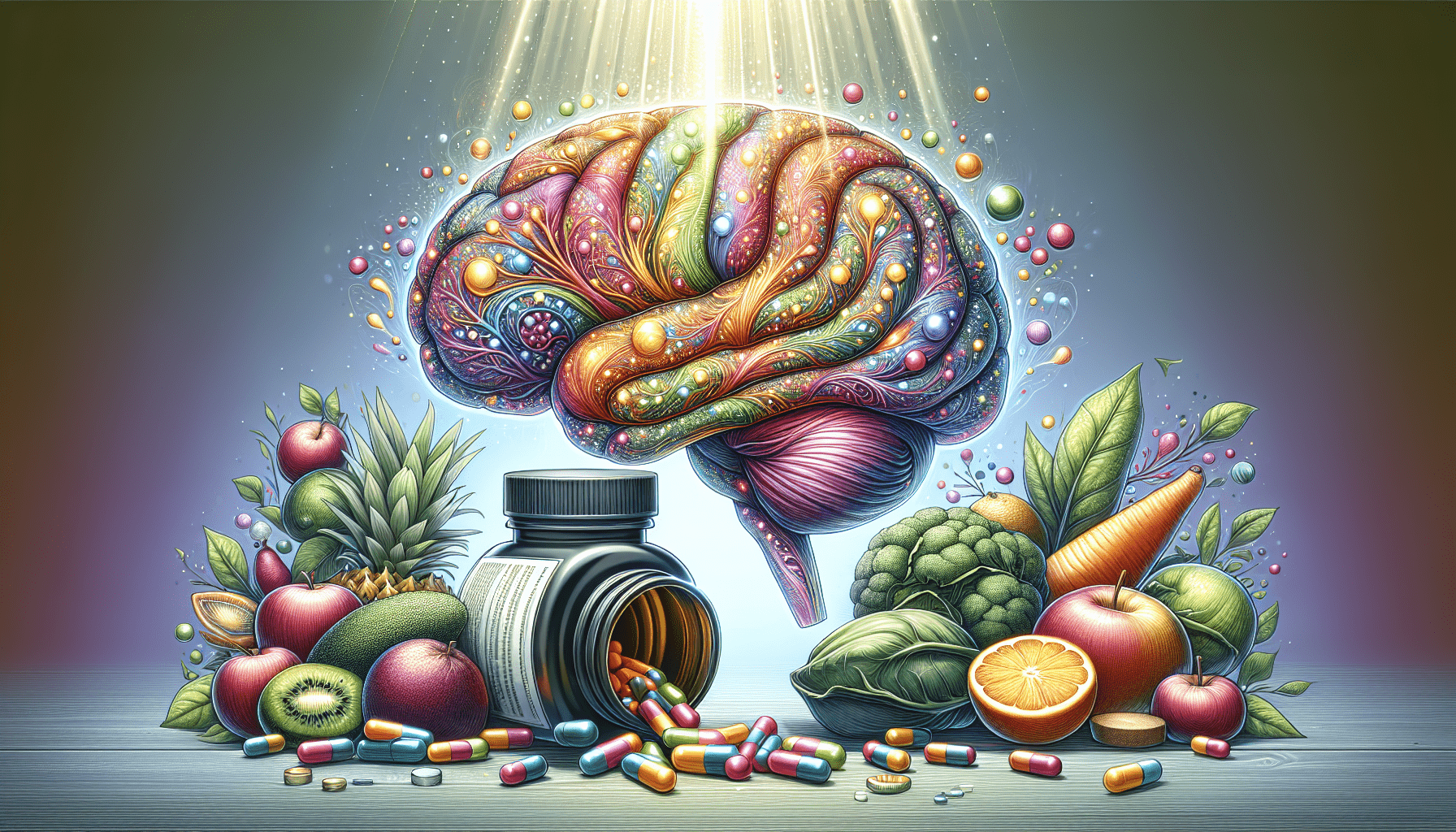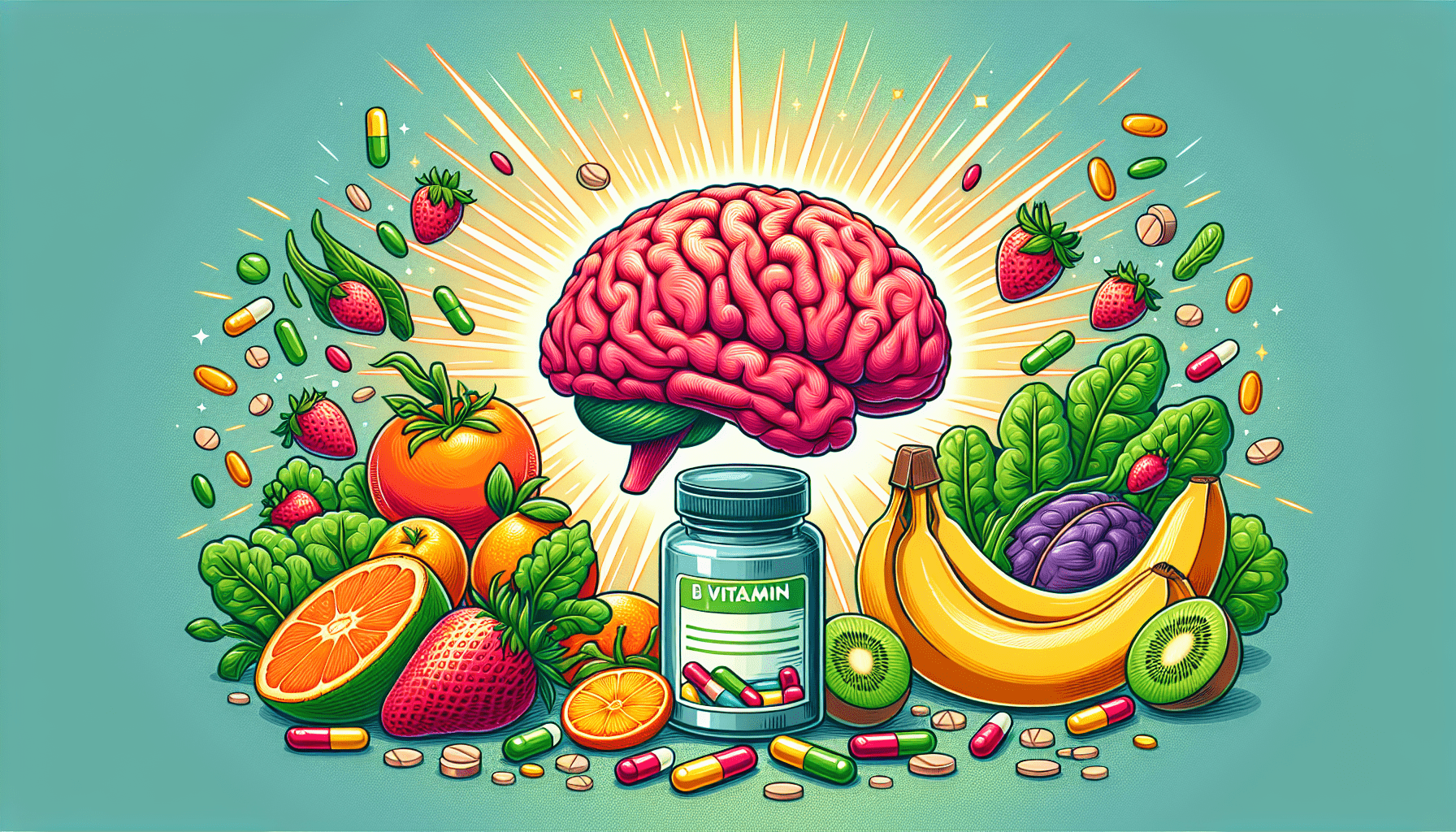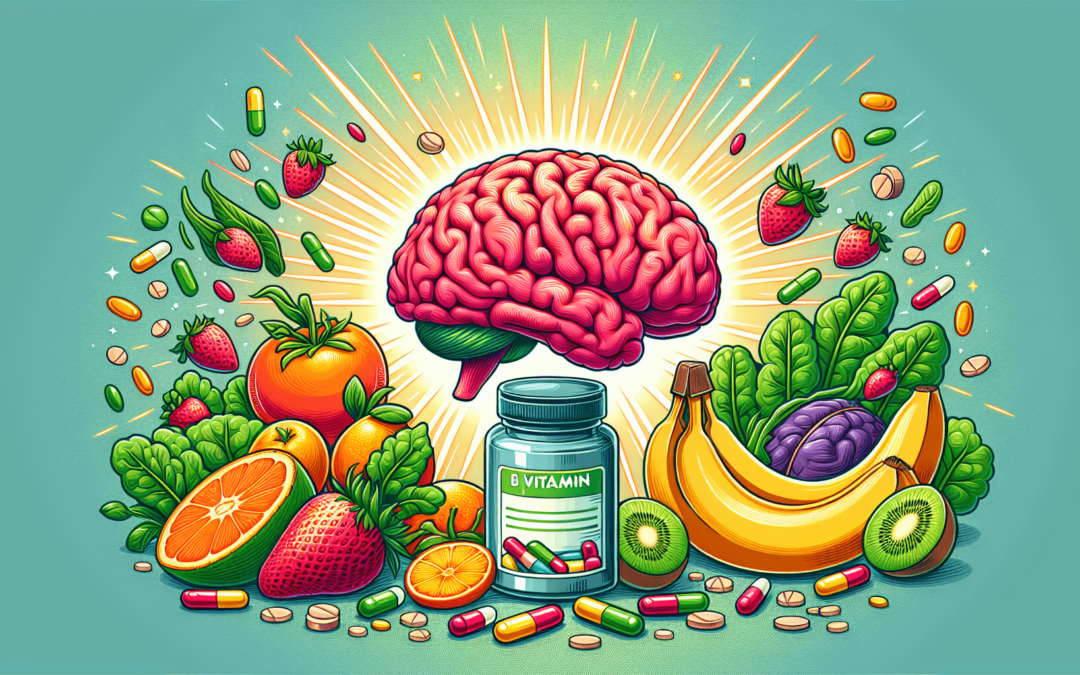Have you ever found yourself struggling to stay focused, feeling like your brain is trapped in a thick cloud of confusion? This phenomenon, famously known as brain fog, affects many people and can have a significant impact on daily life. What’s intriguing, though, is the role that vitamins—particularly B vitamins—might play in alleviating this mental haze. Let’s take a deep dive into understanding how these essential nutrients might be the key to clear thinking.

What is Brain Fog?
Brain fog is not a medical condition but rather a collection of symptoms. You might describe it as a state where you feel mentally sluggish, experience difficulty concentrating, or find that your thoughts just aren’t as sharp as they usually are. It can feel like you’re always one step behind everyone else, and it affects people in various ways.
Common Symptoms of Brain Fog
You may be experiencing brain fog if you notice several of these symptoms:
- Difficulty concentrating
- Memory problems
- Mental fatigue
- Lack of mental clarity
- Slow thinking
- Difficulty processing information
Potential Causes of Brain Fog
Brain fog can be triggered by a variety of factors, ranging from lifestyle choices to medical conditions. Some of the potential causes include:
- Poor Diet: Nutritional deficiencies can impair brain function.
- Lack of Sleep: Sleep is crucial for cognitive function.
- Stress: Chronic stress can affect brain health.
- Medical Conditions: Conditions like thyroid disorders and chronic fatigue syndrome can contribute to brain fog.
- Medication: Some medications have side effects that can include mental cloudiness.
- Hormonal Changes: Hormonal imbalances, especially in women, can lead to brain fog.
Understanding the various causes helps to underline why addressing brain fog often requires a multi-faceted approach. One promising facet is the role of B vitamins in brain health.
The Power of B Vitamins
B vitamins are a group of eight water-soluble vitamins that play intricate roles in cellular metabolism. Each has its own unique function, yet they often work synergistically within the body.
Types of B Vitamins
Here’s a brief overview of the eight B vitamins:
| B Vitamin | Name | Primary Functions |
|---|---|---|
| B1 | Thiamine | Energy production, carbohydrate metabolism |
| B2 | Riboflavin | Energy production, fat metabolism |
| B3 | Niacin | DNA repair, stress responses, metabolism of fats, carbs, and alcohol |
| B5 | Pantothenic Acid | Synthesizes coenzyme A, necessary for fatty acid metabolism |
| B6 | Pyridoxine | Neurotransmitter synthesis, cognitive development |
| B7 | Biotin | Metabolism of fats, carbohydrates, and proteins |
| B9 | Folate (Folic Acid) | DNA synthesis and repair, critical during pregnancy |
| B12 | Cobalamin | Nerve function, red blood cell production |
How B Vitamins Affect Brain Health
Unlike some nutrients that you can afford to be deficient in for short periods, B vitamins must be continually replenished to support optimal brain function. Let’s explore how each of these vitamins specifically contributes to brain health.
Vitamin B1 (Thiamine)
Thiamine is essential for glucose metabolism, converting carbohydrates into energy. The brain is one of the most metabolically active organs and requires a steady supply of glucose. When you’re deficient in thiamine, your brain may not get the energy it needs, leading to symptoms like fatigue and irritability—both of which can exacerbate brain fog.
Vitamin B2 (Riboflavin)
Riboflavin plays a crucial role in protecting the cells from oxidative stress. It acts as an antioxidant and helps to convert food into energy. By fighting off oxidative stress, riboflavin supports overall brain health and cognitive function.
Vitamin B3 (Niacin)
Niacin is required for all parts of the body to function correctly. It’s critical for DNA repair and the metabolism of fats and sugar. Niacin deficiency can cause pellagra, a condition characterized by dementia, diarrhea, and dermatitis—all of which point to its importance in brain health.
Vitamin B5 (Pantothenic Acid)
Pantothenic acid helps synthesize coenzyme A, which is essential for fatty acid metabolism. This is important for synthesizing acetylcholine, a neurotransmitter involved in learning and memory. Low levels of acetylcholine can contribute to memory issues and other cognitive dysfunctions.
Vitamin B6 (Pyridoxine)
Pyridoxine is involved in the synthesis of neurotransmitters such as serotonin and dopamine, which regulate mood and stress. Adequate levels of B6 can influence cognitive development and aid in producing the myelin sheath—an insulating layer that forms around nerves, including those in the brain and spinal cord.
Vitamin B7 (Biotin)
Biotin helps metabolize fats, carbohydrates, and proteins, essentially providing the building blocks for cellular functions. While not as directly linked to brain health as other B vitamins, maintaining the right levels ensures overall cellular health, including that of brain cells.
Vitamin B9 (Folate)
Folate plays a vital role in DNA synthesis and repair, making it crucial for cellular division and growth. It’s particularly important during pregnancy for the development of the fetal nervous system. Folate deficiency in adults can lead to elevated levels of homocysteine—a risk factor for cognitive decline.
Vitamin B12 (Cobalamin)
Vitamin B12 is indispensable for nerve function and red blood cell formation. It helps in synthesizing myelin and plays a vital role in methylation processes, essential for numerous biochemical reactions in the brain. Deficiency in B12 often results in neurological symptoms like memory loss and mood changes, which are commonly seen in brain fog.

Why B Vitamins are Effective Against Brain Fog
Given the myriad of roles B vitamins play in keeping your brain healthy and functioning optimally, it shouldn’t come as a surprise that deficiencies in these vitamins often manifest as cognitive issues, including brain fog. Addressing these deficiencies can help clear the mental cloudiness.
Energy Production and Metabolism
Nearly all B vitamins are involved in the metabolic processes that convert food into energy. Your brain consumes about 20% of your body’s energy despite being only 2% of its weight. Ensuring a good supply of B vitamins helps maintain consistent energy levels, preventing the mental fatigue often linked with brain fog.
Neurotransmitter Synthesis and Function
Neurotransmitters like serotonin, dopamine, and acetylcholine are your brain’s chemical messengers, regulating mood, focus, and cognitive function. B vitamins like B6, B9, and B12 are crucial in synthesizing and maintaining the right balance of these chemicals, helping to mitigate issues like depression and anxiety that commonly accompany brain fog.
Myelin Sheath Formation
The myelin sheath is vital for efficient communication between neurons. Vitamins like B12 and B5 are instrumental in forming and maintaining this protective layer. When this communication is optimized, cognitive processes run more smoothly, reducing the likelihood of experiencing brain fog.
DNA Synthesis and Repair
B vitamins like B9 (Folate) and B12 (Cobalamin) play a role in DNA synthesis and repair. Proper DNA function is critical for cell division and brain health. Any disruptions in these processes can lead to cognitive decline and brain fog.

How to Incorporate B Vitamins into Your Diet
While supplements are an option, obtaining B vitamins from food sources is generally preferable because foods provide a complex of nutrients that work together synergistically. But knowing which foods are rich in these vitamins can be confusing. Here’s a straightforward guide:
Food Sources of B Vitamins
| B Vitamin | Food Sources |
|---|---|
| B1 | Whole grains, pork, fish, and legumes |
| B2 | Dairy products, eggs, green leafy vegetables, almonds |
| B3 | Chicken, tuna, salmon, turkey, avocado |
| B5 | Beef, chicken, whole grains, broccoli, sunflower seeds |
| B6 | Chickpeas, bananas, potatoes, salmon, chicken breast |
| B7 | Eggs, almonds, sweet potatoes, soybeans, chicken liver |
| B9 | Dark leafy greens, asparagus, oranges, lentils |
| B12 | Meat, dairy products, fish, eggs, fortified cereals |
Tips for Better Absorption
Ensuring you absorb these B vitamins effectively can help maximize their brain-boosting benefits. Here are some tips:
- Diverse Diet: Aim for a balanced diet that includes a variety of foods.
- Avoid Alcohol: Excessive alcohol can interfere with the absorption of many B vitamins.
- Probiotics: Gut health affects nutrient absorption, so consuming probiotics might aid in better assimilation.
- Cooking Methods: Steaming and microwaving help retain B vitamins in food compared to boiling.
When to Consider Supplements
While it’s ideal to get B vitamins from food, supplements can be necessary in some cases, particularly for people with certain medical conditions or dietary restrictions. Always consult with a healthcare provider before starting any new supplement regimen.

Lifestyle Changes to Complement B Vitamin Intake
Addressing brain fog often requires a holistic approach that includes lifestyle changes along with nutritional adjustments. Here are some strategies to consider:
Prioritize Sleep
Quality sleep is often the simplest and most effective remedy for brain fog. Aim for 7-9 hours per night, and practice good sleep hygiene:
- Keep a consistent sleep schedule.
- Create a restful environment.
- Limit exposure to screens before bedtime.
Manage Stress
Chronic stress can be highly detrimental to cognitive function. Techniques such as mindfulness meditation, deep breathing exercises, and physical activities like yoga can help manage stress levels.
Regular Exercise
Physical activity boosts blood flow to the brain and stimulates the release of endorphins, which improve mood and cognitive function. Aim for at least 150 minutes of moderate exercise per week.
Stay Hydrated
Dehydration can exacerbate the symptoms of brain fog. Make sure to drink enough water throughout the day to keep your brain well-hydrated.
Monitor Health Conditions
Conditions like thyroid disorders, diabetes, and hormonal imbalances can contribute to brain fog. Regular medical check-ups and managing these conditions under the guidance of a healthcare provider can help mitigate brain fog.

Conclusion
Brain fog can be a frustrating experience, but understanding its potential causes and addressing them through a combination of good nutrition, particularly with B vitamins, and lifestyle changes, can lead to noticeable improvements. The role of B vitamins in energy production, neurotransmitter synthesis, DNA repair, and cellular metabolism makes them invaluable for clear thinking and optimal cognitive function. By incorporating a variety of nutrient-rich foods and perhaps considering supplements under medical guidance, alongside adopting healthy lifestyle habits, you can conquer brain fog and regain your mental clarity.
